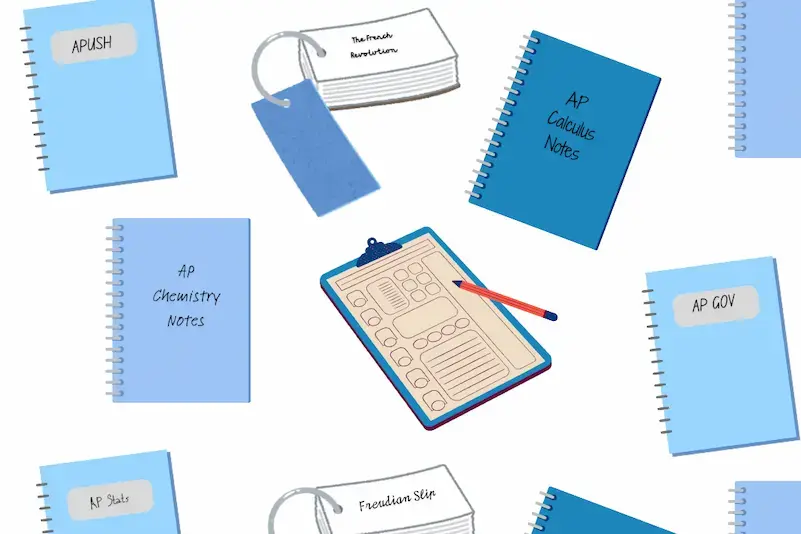Do AP Teachers like AP?

AP testing often looms over the heads of students and teachers alike. Teachers have to
educate students on fixed material year after year. Students have to resurface their knowledge
on a year’s worth of material for a single test. Many views on AP testing vary; which is expected
of a standardized education system. Teachers carry a heavy weight; a weight full of standards
enforced by the College Board. Meanwhile, they must maintain interest in their own subject and
lift a portion of their weight onto their students. As we grasp some of these AP teachers’ views;
we can move forward.
When asked “If you could teach your class with your own advanced style, how would you do it? No rules applying.” Mr. Narasky, PHS’ AP Language and Composition teacher, answered “I would keep the structure and range of the writing elements of the exam. I am not a huge fan of the MCQ portion, I feel like it is tacked on to buffer low writing scores. I would replace the MCQ portion with maybe a performance task, similar to AP art or Computer Science Principles where they submit long form work before the testing elements.” Mr. Narasky also continues to emphasize the more subjective aspects of AP LANG. He notes “AP LANG is unlike many other exams, it isn't about content knowledge, it's about writing ability, reasoning, logic,
argumentation, analysis and creating meaningful and intelligent commentary around non-fiction
concepts such as history, politics, science, etc.”
To the question of “How do you feel about teaching AP curriculum over having the
freedom or your own topics? Is it helpful or restricting?” Mr. Wood, the AP Physics teacher of
PHS, expressed “ The College Board has created the curriculum by consulting with college
professors around the world in many cases. As such, what I teach is set up very well to prepare
students for taking physics and engineering courses in college. As in most things, there is a
trade off between covering some other materials and covering the skills required to pass an AP
test.” This conveys the difficult middle ground of both teaching and taking AP courses in high
school; you cannot expect college-level results and the capabilities of a college student, but you
must challenge students and aid them to comprehend your material.
Replying to “Do you feel that the AP Test is a fair testament of a student's knowledge? If
not; what would be?” Mr. Lambert, our AP Environmental Science teacher at PHS, stated
“Generally speaking; yeah, I think they’re pretty fair and again the question is how are you
gonna do it then? And I think they are doing the best way; doing the best that they can with the
limitations. Could there be a better way? Of course; but do I think they’re doing a pretty solid job
of doing the testing? Yeah, I do.” Mr. Lambert also highlights the present lack of a lab element in
any AP tests, which in subjects such as Chemistry or Art, could alter a student's scores vastly.
The nature of AP testing is full of stress; stress on both students and their teachers to
maintain their images through not only their scores, but also their opinions. Preferring not to be
named, an anonymous teacher had this to say “When I was in high school there were only four
AP classes available, you had to meet a ton of prerequisites, do summer work and it was known
that your social life other than study groups for that class was OVER if you were taking one of
these courses. They would crush you with homework, and the teachers that taught them were
widely respected because it was known that they would be working serious overtime providing
detailed feedback for difficult assignments and tests. Now that taking multiple AP’s per year has
become the expectation, I have seen a few things happen.”
This anonymous teacher continues on to speak their thoughts. These thoughts are of many teachers' humility toward their students; encompassing their time and care for their student’s learning. They bring up the unfortunate transition of cheating from a bad choice to a student’s necessity, alongside the seeming loss of meaning towards taking AP’s and student’s self distinction academically. They expand on this by highlighting the teachers’ lack of enjoyment towards teaching, bringing to light the flaws in a standardized curriculum and how this affects teacher satisfaction with the resources lost in a homogenized curriculum. This teacher also voices the college board’s current goal regarding accessibility of higher-level classes for previously marginalized students.
The thoughts we’ve just understood do not reflect the entirety of PHS; but they do reflect
the varying thoughts on AP testing’s role through our school. For better or for worse: these
outlooks will continue to shift, but ultimately, only students execute their own determination and
growth. Though what won’t change is that teachers will always play the role of preparing these
students for their futures; whether academic or social.

